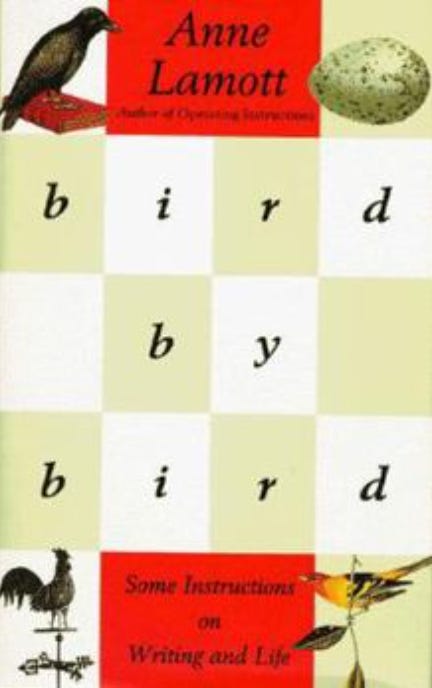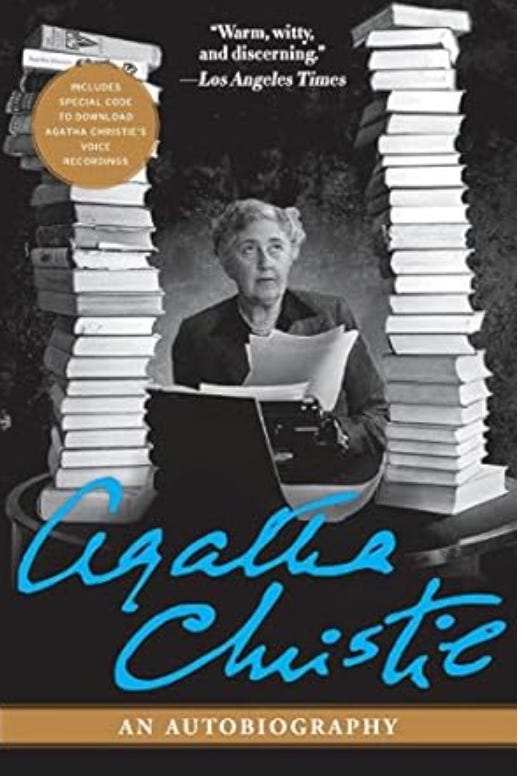The Best Books on Writing
My very favorite books for writers on the process and the life.
Do you like this post? Click the heart button to send me virtual sprinkles!
There is nothing I like better than a good book about writing. Although it’s hard to choose my favorites, here are the ones that live rent-free in my mind, always on the ready for a third or fourth perusal.
The Best Books on Writing
Bird by Bird: Some Instructions on Writing and Life by Anne Lamott
This is often the first book on writing many writers read, and for good reason. The foundational story is of Lamott’s brother, working on a school project the night before it was due. He had to draw a bunch of birds, and was whining to his father about how he’d never finish. Upbeat yet determined, his father told they’d take it “bird by bird”. This book also introduces the famed concept of “shitty first drafts”. By the state of mine, I worry at times I’ve taken this a little too much to heart;)
Perfectionism is the voice of the oppressor, the enemy of the people. It will keep you cramped and insane your whole life, and it is the main obstacle between you and a shitty first draft. I think perfectionism is based on the obsessive belief that if you run carefully enough, hitting each stepping-stone just right, you won't have to die. The truth is that you will die anyway and that a lot of people who aren't even looking at their feet are going to do a whole lot better than you, and have a lot more fun while they're doing it.
The War of Art: Break Through the Blocks and Win Your Inner Creative Battle by Steven Pressfield
A short guide to perseverance, this is a favorite of many writers, who swear by the foundational message of sitting down and doing the work, even when everything is screaming at you to stop. I kept not reading this, and then finally my friend Kirsten forced me to. Spoiler: I loved it. See her take on it here.
Are you paralyzed with fear? That’s a good sign. Fear is good. Like self-doubt, fear is an indicator. Fear tells us what we have to do. Remember one rule of thumb: the more scared we are of a work or calling, the more sure we can be that we have to do it.
The Artist’s Way by Julia Cameron
This is Julia Cameron’s foundational work, and the one that fully introduces her practice of morning pages, the practice of writing three long-hand pages every morning before doing anything else. (I’ve written more on the practice here.) Many writers swear by morning pages, including Elizabeth Gilbert, who says she wouldn’t have written Eat Pray Love without it. If you’re a writer, this is a practice worth trying, even if you don’t stick with it long-term.
Serious art is born from serious play. Progress, not perfection, is what we should be asking of ourselves. Survival lies in sanity, and sanity lies in paying attention...the capacity for delight is the gift of paying attention. Creativity occurs in the moment, and in the moment we are timeless.
On Writing: A Memoir of the Craft by Stephen King
I only wish I had this one to read all over again for the first time. Wildly entertaining, and wilding informative, I loved this classic by one of the world’s best writers, known for his creepy thrillers that make your skin crawl. His process, and the front cover image of his office, are of endless fascination.
Writing isn't about making money, getting famous, getting dates, getting laid, or making friends. In the end, it's about enriching the lives of those who will read your work, and enriching your own life, as well.
This book is about land, and a house, and writing. In that order. I have never forgotten the image of her desk, and her library, and her windows looking out to the sharp red cliff from where the birds swoop down. A fantastic read. Come for the words, leave with the birds.
The mountain pine beetle is a tiny creature that chews through a lodgepole’s bark, gouges out a hollow in the wood and lays its eggs. The larvae hatch hungry and feed on the cambium layer, a tree’s most vital part, the annual layer of cells that makes up a growth ring. To prevent drowning in the tree’s sap, the beetle larvae can eject a choking fungus that not only halts the life-giving flow of sap, but stains the wood a grey-blue color
Kitchen Privileges by Mary Higgins Clark
I found this lesser known one at a New Jersey church charity shop in the town where my BFF lives. It was large-print (!), but I didn’t care, because I was so pleased to pick up a memoir of such a great writer that I had literally never heard of before (the book, not the writer). I tore through it, and loved hearing about how she literally pulled herself up from her bootstraps and wrote her way out of being a widowed mom of four. I also loved reading about the insane advance she got for her first novel. An unusual and fun one if you’ve read any of Clark’s works.
Plotting and Writing a Suspense Novel by Patricia Highsmith
A great, short book that I loved from the author of The Talented Mr. Ripley. She’s full of wit and snark and it gave me great insight into the power of plot, but also the power of the narrator to change the vision of a story. (And why changing the narrator can change everything.)
“Writing is a way of organizing experience and life itself.”
Agatha Christie, An Autobiography, by Agatha Christie
This is a long book, and parts of it are not at all focused on writing. Long sections focus on Christie’s childhood, her two marriages, her time as a budding archaeologist, and then, notably, almost nothing at all about her 11 day disappearance. (For that, read Lucy Worsley’s incredible biography of her.) That said, it’s a must-read for any writer, as it gives incredible insight into “The Queen of Mystery” and the bestest selling author of all time. I’ve read twice.
There was a moment when I changed from an amateur to a professional. I assumed the burden of a profession, which is to write even when you don't want to, don't much like what you're writing, and aren't writing particularly well
Daily Rituals: How Artists Work by Mason Currey
This is a great one to pop in and out of for inspiration. In very short essays, Currey shares how some of the greatest writers of all time did their work. The stories vary wildly, from Anthony Trollope, who forced himself to write 3,000 words every morning before heading off to his job at the post office to Jean-Paul Sartre, who ate amphetamine tablets to get going!
“It’s cleansing. If I hadn’t been at work all the time, I would have been a lunatic.” - Morton
This is the Story of a Happy Marriage: Ann Patchet
This book is about a lot of things, but writing gets in there, and there is one long essay in particular all about Patchett’s thoughts on creativity and process which I heart with everything. I’d love to see her expand this into a full-length book on writing. Well worth a read.
If you want to write, practice writing. Practice it for hours a day, not to come up with a story you can publish, but because you long to learn how to write well, because there is something that you alone can say.
Honorable Mentions
Fallar Otra Vez by Alan Pauls (only in Spanish currently): I’m loving this short one on the beauty of imperfect writing.
The Clothing of Books by Jhumpa Lahiri: I liked this one, and I love Lahiri. This is focused on book production and less the writing process.
Negotiating with the Dead by Margaret Atwood: I haven’t read this book! I judge myself harshly!!!!! I have already ordered it!!!!
A Writer’s Life by Guy Talese: Another one I haven’t read but is generally well loved.
Create Dangerously by Edwidge Danticat: I can’t wait to read this one.
Other books on writing I want to read?
There are so many other writers out there I would LOVE to see a book on writing from. Most importantly: Barbara Kingsolver (who wrote The Poisonwood Bible 5 times in the voice of each narrator before deciding on th right version), Alexander Mccall Smith (who writes thousands of words an hour in a trance-like state), Louise Penny (who writes at her Canadian kitchen table), and Arundhati Roy (who says there is nothing better than the years she spends in the world of one of her novels).
Have you read any of these ones? Or do you have other favorites?
Click below to leave a comment.














Writing Down the Bones by Natalie Goldberg is an all-time favorite and one I recommend over and over again!
Refuse To Be Done by Matt Bell is forever a favorite!